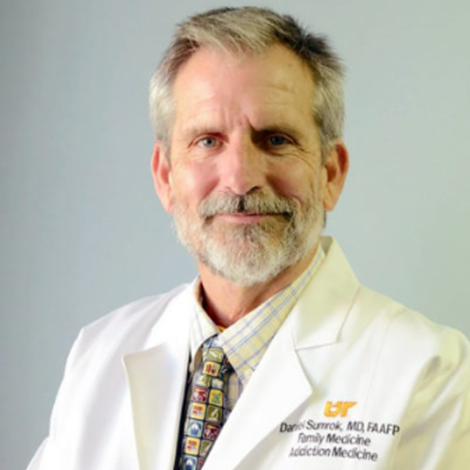
Daniel D. Sumrok, MD, FAAFP, DFASAM
Position:
Immediate Past PresidentFocus Areas:
Advancing Trauma-informed care Adults with Complex Health & Social NeedsMental Health & Substance AbuseTrauma Informed CareAfter serving as a Navy corpsman during the Vietnam era, Dan Sumrok, MD, DFASAM, ABAM, ABPM, published an article in the West Virginia Medical Journal on what he perceived as a connection between combat experience and physical and behavioral health problems: “Suicide; child and spouse abuse; jail terms; and, psychiatric and physical maladies are the public health legacy of the Vietnam War.” Years later, a team of researchers at Kaiser Permanente and the Centers for Disease Control and Prevention (CDC) would publish the landmark Adverse Childhood Experiences (ACE) Study, which demonstrated a relationship between experiencing trauma and poor health later in life. Though Dr. Sumrok admits his original definition of trauma was limited — taking into account only trauma experienced during combat — his interest in trauma-informed principles was apparent from early in his career.
Today, Dr. Sumrok has a practice of approximately 200 patients in rural Tennesseestruggling with substance use disorder. He provides medication-assisted treatment (MAT), motivational enhancement therapy, cognitive behavioral therapy, 12-step facilitation, and leads individual and group therapy sessions. Many of his patients have achieved incredible results: nearly all are employed, and only two are currently involved with the criminal justice system — one of whom is seeking to regain child custody. Some of his patients drive for hours to take part in group therapy. Though he acknowledges the chronic shortage of behavioral health care providers in rural areas as a factor, he believes that his patients travel great distances because he offers something different — a trauma-informed approach to care.
In addition to treating patients, Dr. Sumrok dedicates his time to train medical students at the University of Tennessee’s Health Science Center’s (UTHSC) College of Medicine to ensure a new generation of addiction medicine providers understand the value of a trauma-informed approach to care. Every student learns the CDC’s prescribing guidelines for opioids for chronic pain, as well as the rudiments of addiction medicine. UTHSC also offers one of the nation’s small — but growing — number of fellowships dedicated to addiction medicine.
“We want to hit them from the beginning with this message — so that when they’re old like me, they won’t have to relearn their framework. It’s something that will just become second nature,” he says. “And they’re going to think of things that I never thought of, they’re going to have tools available I never did, and they’re going to discover a path forward in ways that I can’t imagine today, and likely have each other to lean on for support.”
